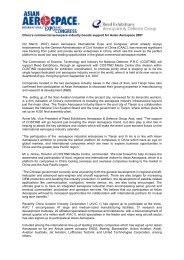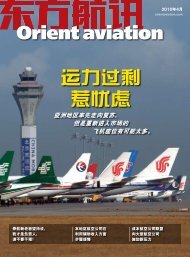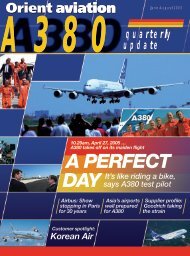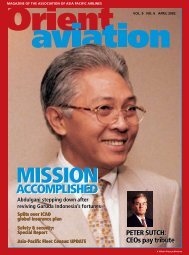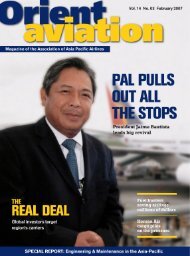Create successful ePaper yourself
Turn your PDF publications into a flip-book with our unique Google optimized e-Paper software.
the market. Few airlinescomprehensively cover theentire country, which meanssome routes are the preserveof small carriers <strong>Air</strong>Asiashould easily beat.“There are so many routes we have notexplored yet. We have not even started theeastern part of Indonesia. There is still a bigopportunity there,” said Sendjaja.To support expansion, <strong>Air</strong>Asia isconsidering hubs, in addition to Jakarta,in Solo, Surabaya, Bali, Sumatra andKalimantan. “If we have hubs in Kalimantanand Sumatra we can go up to China. There ishuge demand for China, people are not onlygoing to see ancestral lands and history,but also for tourism and medication,” saidSendjaja.Indonesia <strong>Air</strong>Asia serves Padang, Medan,Kuala Lumpur, Batam, Surabaya, Denpasarand Balikpapan from Jakarta. Medan-Penang and Kuala Lumpur-Surabaya wereadded in March with plans for Penang,Solo and Pekanbaru. It intends to operate64 flights daily by December, from 32 lastJanuary.Singapore services are in limbo afterits permit was suspended by the Singaporeauthorities. <strong>Air</strong>Asia said it is being used asa pawn in a dispute between Indonesia andSingapore over traffic rights.<strong>Air</strong>Asia Indonesia operates six B737-300s. Around 15 aircraft should bear <strong>Air</strong>AsiaIndonesia’s bright red livery by the end of2007 providing 130 flights daily. In 2008,the fleet will switch to <strong>Air</strong>bus A320s, ofwhich parent, <strong>Air</strong>Asia, has ordered 60 plus40 options. Garuda holds the maintenancecontract.Crewing those aircraft is not a problemyet, although that may change. Sendjaja saysNAS, a Saudi Arabian outfit, and Malaysia<strong>Air</strong>lines are recruiting in Indonesia withattractive packages.As in Malaysia and Thailand, <strong>Air</strong>AsiaIndonesia is aiming for a 25-minuteturnaround. That is not always possible: oneflight in five departs late. “There are problemsregarding traffic, missing passengers, latefuelling by Pertamina. Problems on theaircraft also cause delays,” said Sendjaja.“Every week we have a meeting of alldepartments related to on-time performanceto discuss what is happening and improveit. The captains play a part, the crew playa part, the ground crew play a part, thehandling agent, a third party, also playspart,” he added.‘People in the country side, believe it or not,still keep their money under the mattress’Sendjaja WidjajaDelays add costs. As do travel agents.Unlike Malaysia and Thailand, they remainkings of the market in Indonesia. “Eightypercent of the market now uses travelagents. By adapting our system to link upwith Galileo, agents will be able to accessour system. The costs will be passed backto the passengers in the ticket price,” saidSendjaja.That is part of an arrangement that seesGalileo distributing <strong>Air</strong>Asia globally via itsFlight Integrator platform.Sendjaja claimed only one in 10 ticketsIndonesia <strong>Air</strong>Asia sells now is throughan agent. Online and telesales account for70% of <strong>Air</strong>Asia ticket sales. Agents survivebecause most people who fly are wealthy.They expect and are used to being served.Some routes are in the grip of grey marketsyndicates that provide door-to-door servicefor passengers.“They will deliver tickets to your house.They will help you check in at the counter.They treat people like valued customers. Witha lot of airlines, they have more flexibility infinding flights to match people’s schedules.If you want to go to Surabaya, there are 52flights,” said Sendjaja.Agents are not the only problem.Payment is a big headache. Most peopledo not have credit or debit cards. However,unlike Malaysia or Thailand paying throughATMs is proving a headache. There are alsono modern widespread convenience storechains like 7-Eleven that can handle bills.“It is different because of theinfrastructure. We are looking intopayment through banks like people do withtelephone bills. People in the countryside,believe it or not, still keep their money underthe mattress,” said Sendjaja.Reaching those people is essential fora bigger market. Without agents and theircommissions that is going to be very hard.In some towns it even makes sense to openoffices, although Sendjaja plays down thecosts. “We are going to open sales offices insmall towns like Padang where the airportis far away. It does increase cost, but ifcomparing to loss of revenue it is not thatmuch,” he said.Despite the delays, additional offices andagents’ bills, Sendjaja reports a 70% loadfactor exceeding breakeven by 5%. “At themoment we expect a yield of between 5% –7%. Average fares have been going up alongwith load factor,” he said.However, balance sheets still match thecolour of <strong>Air</strong>Asia’s livery. In February,the <strong>Air</strong>Asia Group revealed Indonesia<strong>Air</strong>Asia lost 2.1 million ringgit (US$0.56million) for the last three months of 2005,an improvement though on the three millionringgit it lost in the previous quarter.Success is not coming easily in Indonesiafor <strong>Air</strong>Asia and becoming a major player,as it has done in Malaysia and Thailand,may prove elusive. But if it can turn a profitholding a reasonable piece of the market itmay have the foundation it needs to securedominance of Southeast Asia.Lion <strong>Air</strong>: one of <strong>Air</strong>Asia’s major rivals that will battle hard to retain itsmarket shareMAY 2006 ORIENT AVIATION 47




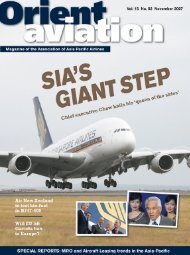
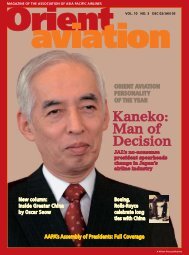
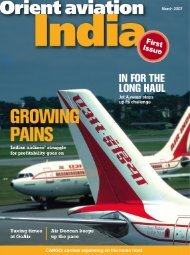
![OAMag-V7N4-Cover [Converted] - Orient Aviation](https://img.yumpu.com/48598575/1/190x255/oamag-v7n4-cover-converted-orient-aviation.jpg?quality=85)

